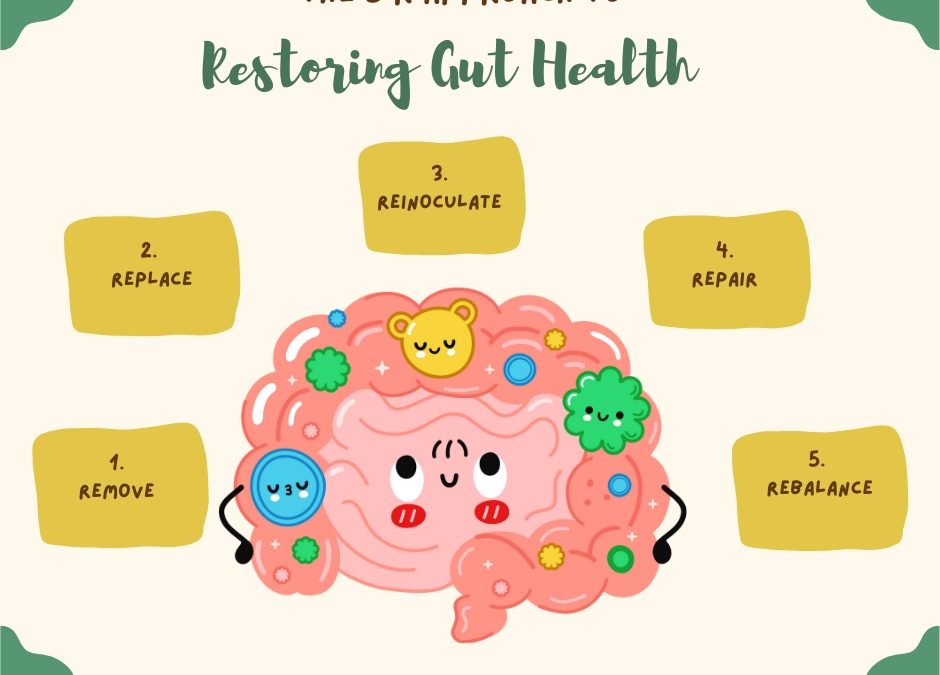Digestive dysfunction and impaired gut health underly so many health conditions, both physical land mental (newsflash… the brain and body are not separate). So, when I work with a client, I focus less on overt symptoms such as brain fog, skin irritation, fatigue, or constipation, and more on the core foundations of health (including digestion, blood sugar regulation, minerals, fatty acids, and more).
When it comes to optimizing the foundation of digestion, working on gut health is a key component of treatment. You have heard me say this before so I won’t dive into that here, but a robust gut microbiome is crucial to overall health and wellness on a number of levels.
There is a general 5-step framework that I use when working with clients who are in need of help with digestion and the gut. By breaking things down in this manner, together we inherently spend time getting to the root of the actual problem, versus treating symptoms. By using the framework, I am also able to address problems in the order they occur. This approach inherently targets all aspects of digestion, north to south, which we know need to all be in working order for optimal health. Here are the steps:
Remove
In this step, we are looking to remove all gut stressors and irritants. This can include things like foods an individual may be allergic or intolerant to. The top food allergens are gluten, dairy, soy, corn, eggs, nuts, shellfish, and sugar. At times, blood lab work or stool testing can help to identify some of these foods. A standard elimination diet can also be helpful. Sometimes medications that an individual is taking may also serve as an irritant to the gut. That said, I always encourage a client to work with their prescribing physician to wean off of medications if it makes sense to. Working on removing sources of chronic stress may also be helpful here, as stress can cause significant gastrointestinal inflammation and disruption to the gut microbiome.
Replace
In this step, we want to focus on replacing key nutrients that may be missing from the diet. So, incorporating a nutrient dense, properly prepared, whole food diet will be important. I like to ensure that clients are getting enough of both macro nutrients (carbs, fats, and protein), as well as micro nutrients (vitamins and minerals). In addition, ensuring that there is enough stomach acid, digestive enzymes, and bile being produced means that we are making sure digestion is functioning optimally from the more northern points in the digestive chain. Sometimes supplementing with bitters, HCl, enzymes, or bile supporting nutrients can be incredibly helpful to get someone back on track.
Reinoculate
Given that in most disrupted gut situations, the balance of commensal to opportunistic bacteria is out of whack, we want to repopulate the gut with plenty of good bacteria. This is where probiotic rich food and drinks will want to be a focus. These include such foods as sauerkraut, kombucha, kefir, kimchi, miso, etc. Sometimes probiotic supplements can be helpful as well, but we want to take a food first approach. Additionally, ensuring that the diet is rich in enough prebiotic fiber and starches to serve as food for healthy bacteria will be important. Foods rich in prebiotics include garlic, asparagus, onions, leafy greens, whole grains (quinoa, oats), apples, flaxseed, lentils, jicama, and chicory root.
Repair
Once we have pulled out the offending foods, and added in the right ones, it is time to work on repairing the integrity of intestinal walls. Reversing leaky gut will help to prevent harmful substances from traveling outside of the intestinal tract, and will reduce the immune reaction that occurs when they do. Essential key nutrients such as zinc, glutamine, and vitamins A/C/D/E can help restore the lining of the digestive tract and promote absorption. In this step, I also like to think about addressing pathogens, parasites, and severe dysbiosis (conditions like SIBO or Candida). Antimicrobial and antifungal protocols (with the use of binders) may be beneficial to help further repair the health of the gut microbiome. This is not something that you want to do without first ensuring the digestion is working well, and pathways of detoxification are open. So, it is always best to work with a practitioner on a complicated protocol such as this.
Rebalance
In this last step, I like to think about addressing the many lifestyle factors that also play a role in optimal health. Ensuring that a client is properly hydrated, is managing stress, moving daily, and sleeping well will go a long way in supporting their overall digestive and physical well being.
If you or someone you know is in need of digestive and gut health support, please reach out for a FREE discovery call today. It is never to late to make a change for the better!



Recent Comments